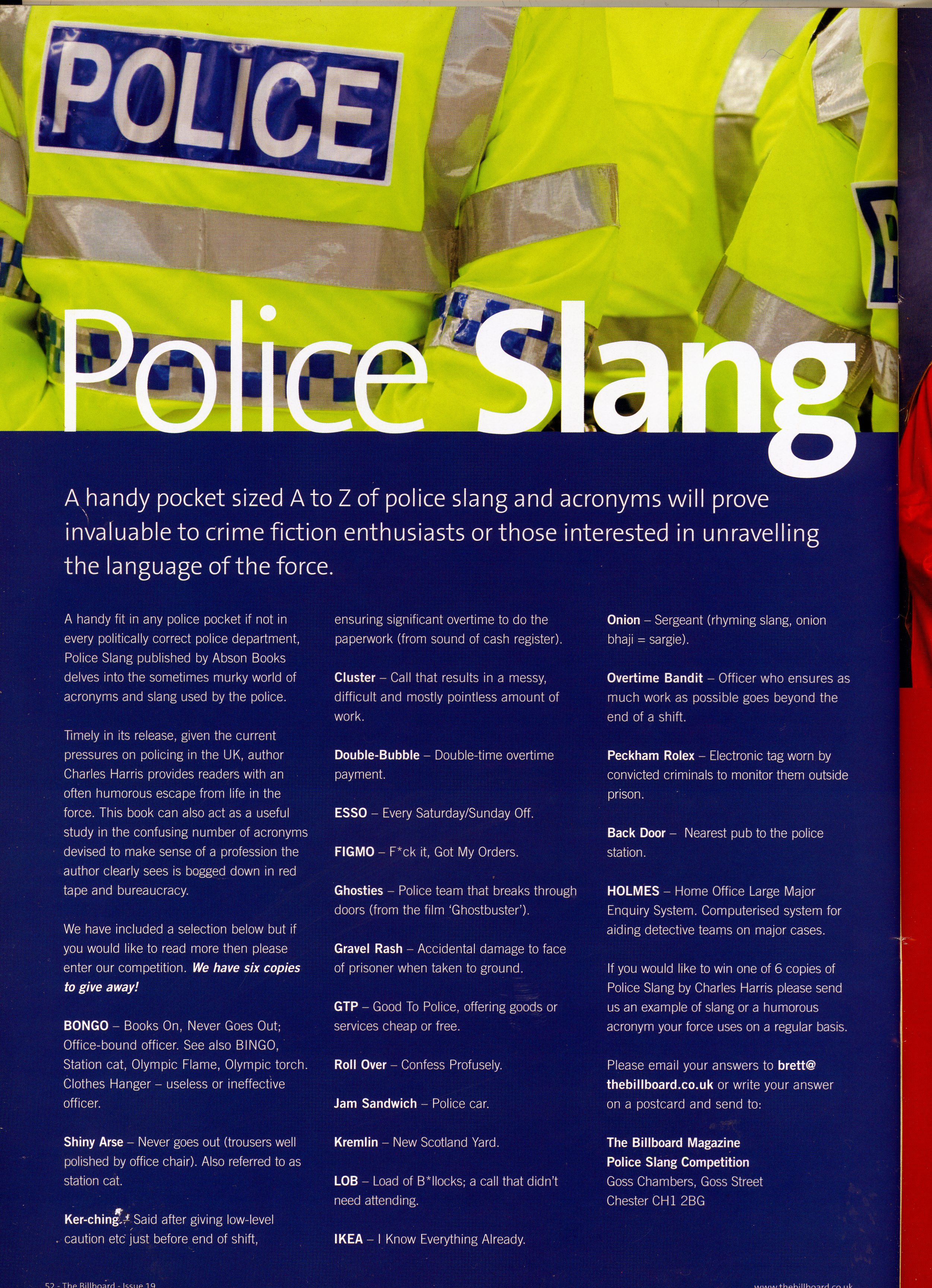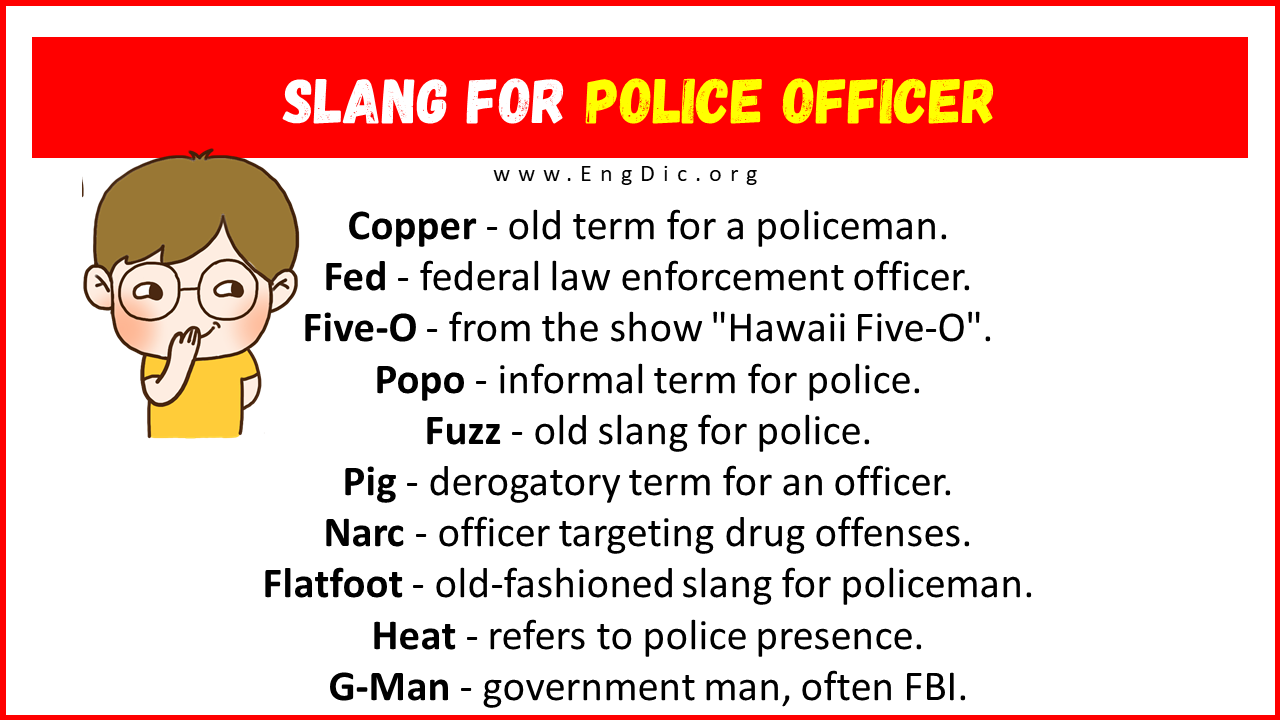Law enforcement officers are often referred to by various slang terms depending on the region, culture, and context. Slang for police has evolved over time, reflecting societal attitudes and cultural influences. Understanding these terms can provide valuable insights into how communities perceive and interact with law enforcement. In this article, we delve into 12 popular slang terms for police, exploring their origins, meanings, and usage.
Slang terminology for police officers is a fascinating aspect of language that mirrors the relationship between law enforcement and the public. These terms often carry connotations that range from respectful to derogatory, depending on the context in which they are used. As such, it is essential to approach the subject with sensitivity and an open mind.
This article aims to provide a thorough understanding of slang for police, ensuring that readers gain valuable insights into the language and culture surrounding law enforcement. By exploring these terms, we can foster better communication and mutual respect between communities and the police.
Read also:Marc Blucas And Ryan Haddon A Deep Dive Into Their Careers And Impact In The Entertainment Industry
Table of Contents
- Introduction to Slang for Police
- A Brief History of Police Slang
- Slang Term 1: "The Fuzz"
- Slang Term 2: "Pigs"
- Slang Term 3: "Cops"
- Slang Term 4: "Five-O"
- Slang Term 5: "The Heat"
- Slang Term 6: "Blue"
- Slang Term 7: "The Man"
- Slang Term 8: "Law"
- Slang Term 9: "12"
- Slang Term 10: "PO"
- Slang Term 11: "Lids"
- Slang Term 12: "Dicks"
- Conclusion
Introduction to Slang for Police
Slang for police is a widespread phenomenon that reflects the dynamic relationship between law enforcement and the public. These terms often emerge from popular culture, regional dialects, or historical contexts. Understanding the nuances of police slang can help bridge the gap between communities and officers by fostering mutual understanding.
In this section, we will explore the cultural significance of slang for police and its role in shaping public perception. By examining the origins and meanings of these terms, we can better appreciate the complexities of the language used to describe law enforcement.
A Brief History of Police Slang
The evolution of slang for police is deeply rooted in historical and cultural contexts. From the early days of law enforcement to modern times, slang terms have been used to describe officers in various ways. Some terms have positive connotations, while others carry negative implications.
For instance, the term "cop" originated from the abbreviation of "constable on patrol" and has become a widely accepted term for police officers. On the other hand, terms like "pigs" emerged during the civil rights movement and carry derogatory connotations. Understanding the historical context of these terms is crucial for appreciating their significance.
Slang Term 1: "The Fuzz"
"The Fuzz" is one of the most popular slang terms for police officers. It originated in the 1960s and is believed to have been derived from the beards and mustaches worn by officers during that era. This term is generally considered neutral and is often used in casual conversation.
Origins and Usage
The term "The Fuzz" gained popularity through its use in popular media, including films and television shows. It is often used in a lighthearted manner and does not carry the same negative connotations as some other slang terms for police.
Read also:Red Hot Chili Peppers Singer The Voice Behind The Iconic Hits
- Used in casual conversations
- Often featured in pop culture
- Generally neutral in tone
Slang Term 2: "Pigs"
"Pigs" is a slang term for police that emerged during the civil rights movement of the 1960s. It carries a negative connotation and is often used to express dissatisfaction or distrust toward law enforcement. The term reflects the tensions between communities and police during that era.
Cultural Significance
The use of "pigs" as a slang term for police highlights the historical struggles for civil rights and social justice. While it remains a controversial term, it underscores the importance of addressing issues of trust and accountability in law enforcement.
Slang Term 3: "Cops"
"Cops" is a widely accepted slang term for police officers and is derived from the abbreviation "constable on patrol." It is one of the oldest and most commonly used terms for law enforcement and is generally considered neutral in tone.
Popularity and Acceptance
The term "cops" is frequently used in everyday language and is often featured in media and literature. Its widespread acceptance reflects the neutral nature of the term and its lack of negative connotations.
Slang Term 4: "Five-O"
"Five-O" is a slang term for police that gained popularity through its use in the television series "Hawaii Five-O." The term is often used in a casual or humorous context and does not carry strong negative or positive connotations.
Media Influence
The popularity of "Five-O" as a slang term for police highlights the influence of media on language and culture. Television shows and films often shape public perception of law enforcement and contribute to the evolution of slang terminology.
Slang Term 5: "The Heat"
"The Heat" is a slang term for police that is often used in urban communities. It carries a slightly negative connotation and is typically used to describe law enforcement in a cautionary or warning context.
Urban Usage
The term "The Heat" reflects the cultural dynamics of urban environments and the complex relationship between law enforcement and communities. Its usage often serves as a warning or alert to others about police presence.
Slang Term 6: "Blue"
"Blue" is a slang term for police that refers to the color of their uniforms. It is often used in a neutral or positive context and highlights the symbolic nature of police attire.
Symbolic Meaning
The use of "Blue" as a slang term for police underscores the importance of symbolism in shaping public perception. The color blue is associated with trust, authority, and professionalism, making it a fitting representation of law enforcement.
Slang Term 7: "The Man"
"The Man" is a slang term for police that reflects broader societal attitudes toward authority figures. It is often used in a negative or cautionary context and carries connotations of oppression or control.
Societal Implications
The term "The Man" highlights the tension between individual freedom and institutional authority. Its usage often reflects broader societal concerns about power dynamics and accountability.
Slang Term 8: "Law"
"Law" is a slang term for police that is often used in a casual or humorous context. It reflects the role of law enforcement in maintaining order and upholding the law.
Positive Connotations
The term "Law" carries positive connotations and is often used to emphasize the importance of legal systems and justice. Its usage highlights the essential role of law enforcement in society.
Slang Term 9: "12"
"12" is a slang term for police that originated in the early 20th century and is believed to have been derived from the code "12W," which was used by officers to indicate their location. It is often used in a neutral or cautionary context and reflects the evolving nature of police slang.
Historical Context
The term "12" highlights the historical roots of police slang and its evolution over time. Its usage reflects the ongoing relationship between law enforcement and the public, as well as the importance of communication and understanding.
Slang Term 10: "PO"
"PO" is a slang term for police that is short for "police officer." It is often used in a neutral or professional context and reflects the abbreviated nature of modern language.
Professional Usage
The term "PO" is frequently used in law enforcement circles and other professional settings. Its usage highlights the importance of clear and concise communication in both formal and informal contexts.
Slang Term 11: "Lids"
"Lids" is a slang term for police that refers to their hats or caps. It is often used in a casual or humorous context and reflects the symbolic nature of police attire.
Cultural Significance
The term "Lids" highlights the cultural significance of police uniforms and their role in shaping public perception. The use of such terms often serves as a lighthearted way to acknowledge the presence of law enforcement.
Slang Term 12: "Dicks"
"Dicks" is a slang term for police that carries a negative connotation and is often used to express frustration or dissatisfaction with law enforcement. Its usage reflects the ongoing challenges of building trust and accountability between communities and officers.
Challenges and Opportunities
The term "Dicks" underscores the importance of addressing issues of trust and communication in law enforcement. By fostering mutual respect and understanding, communities and officers can work together to build stronger, more effective relationships.
Conclusion
In conclusion, slang for police is a complex and evolving aspect of language that reflects the dynamic relationship between law enforcement and the public. By exploring the origins, meanings, and usage of these terms, we can gain valuable insights into the cultural and historical contexts that shape public perception.
We invite you to share your thoughts and experiences in the comments section below. Additionally, feel free to explore other articles on our site for more information on related topics. Together, we can foster better communication and mutual respect between communities and law enforcement.


